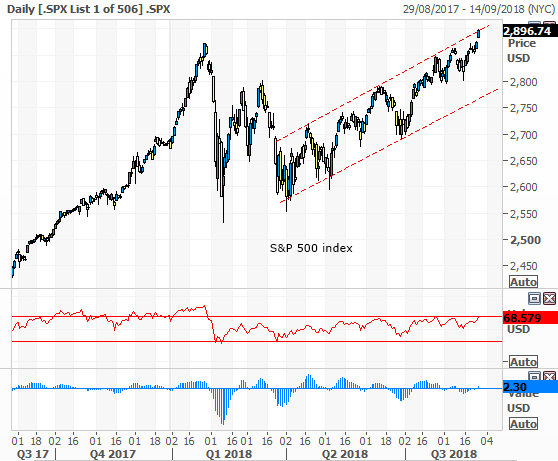How to catch the top
This is a daily chart of the S&P 500 index which shows that it is now higher than the record high in February and is very close to being overbought once again, a rare occurrence for such a large index. As you can see, using a bit of amateur charting, it is now also top of the six-month trading range if not busting out to the upside.

There is a natural human investor assumption of “mean reversion”. What goes up must come down. On which basis we are all now watching this blow off and wondering when the sell-off is going to come.
But selling because something has gone up is the most amateur of mindsets and typical of human wiring which is not naturally engineered for investment.
As any technical aficionado will tell you, you buy things that are going up and only sell them when they go down. On that basis my humble advice remains the same as always, don’t bother trying to predict the top of the market, wait for it. The trick to that is twofold:
Being vigilant - A classic weakness of the average investor is complacency. Believing everything is okay when in fact it is exceptional. The US market is up 58% in 2 ½ years. This is not normal it is great. So do not take it for granted. The higher it goes the more vigilant you need to become, not the more relaxed. The air gets thinner at altitude. When a sell-off comes it will happen more quickly and more sharply than it will at low altitude. And the higher the market goes the less of an excuse it will take to knock it off its perch. So keep watching, more so at higher levels. Even though it’s not allowed, keep that mobile phone in your golf bag just in case it all goes oblong halfway through the round.
Be prepared to act when it happens - Another very costly investor weakness is inaction. Watching markets fall, or a stock fall, and not doing anything about it is second-rate. The stock market is not a weighing machine (as all those Buffett quoting puritanical value investors tell you it is in order to excuse themselves from having to time the market) it is a voting machine.
Sentiment is a huge and enduring factor. It can swamp value for long periods. You have to gauge it just as you do value. Value is easy, its numbers. Sentiment is hard, it is ethereal. But that doesn’t mean you can’t respect it as many don’t. You are not buying a company when you buy a stock you are buying into a share price journey which includes sentiment as well is value factors and you cannot operate on value alone. You might as well put blinkers on if you think value is all you need to focus on.
You don’t have to believe me, hopefully a lot of investors don’t, but those of us who are realistic about the stock market need to react to changes in trend not sit there with our thumbs up our a@#$ quoting people far smarter, richer and patient than ourselves. You can afford to ride the parabolic moments in the market just so long as you have the clarity of mind to change your mind when it looks like ending. We appear to be going parabolic. We all saw in February how quickly that can change. Do something when the time comes. Denial is a very expensive luxury that only the very wealthy can afford and the deluded will endure.
1 topic

